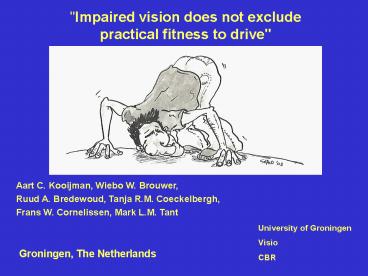Geen diatitel - PowerPoint PPT Presentation
1 / 23
Title:
Geen diatitel
Description:
– PowerPoint PPT presentation
Number of Views:62
Avg rating:3.0/5.0
Title: Geen diatitel
1
"Impaired vision does not exclude practical
fitness to drive"
Aart C. Kooijman, Wiebo W. Brouwer, Ruud A.
Bredewoud, Tanja R.M. Coeckelbergh, Frans W.
Cornelissen, Mark L.M. Tant
University of Groningen Visio CBR
Groningen, The Netherlands
2
Study on Practical Fitness to Drive of
Subjects with Central or Peripheral Visual
Field Defects.
3
Free publicity in the newspapers
4
- Inclusion Criteria and Tests
- inclusion 0.1 lt VA lt 0.5 and / or
- horizontal VF lt 1200
- driving experience gt 100 000 km
- no cognitive impairment (MMSE, Bells Test)
- ophthalmic screening
- visual function refraction, VA, VF, CS, DA,
stereopsis - visual attention UFOV-like, AFOV, fixation and
saccades - practical fitness to drive assessment on the road
- driving test in a driving simulator
5
Assessment of practical fitness to drive
- intermediate level
- between
- medical fitness to drive
- and
- driving skill
6
On-road driving test for assessment of
practical fitness to drive
- Evaluation by an expert in
- assessing on-road driving in
- handicapped persons
- using candidates own car, if possible
- in the regional area of the candidate
- comprises city, rural, and highway driving
7
On-road driving test for assessment of
practical fitness to drive
- It is evaluated
- whether someone
- can drive fluently and safely
- given
- his/her impairments and
- including use of compensations and adaptations
8
Assessing practical fitness to drive
- Test Ride to Investigate Practical Fitness to
Drive (TRIP) comprises tactical and operational
aspects
- lateral position control
- following distance
- speed control
- visual scanning and viewing behaviour
- perception of traffic signals
- passing and overtaking
- use of car controls
- anticipation and traffic insight
- interaction with other traffic participants
9
Assessing practical fitness to drive
- Test Ride to Investigate Practical Fitness to
Drive (TRIP) comprises tactical and operational
aspects
- Mostly 4-point-rating scales on each item
- Most aspects broken down to specific situations
10
Scores derived from TRIP
- Operational score (mechanical handling and
dealing with external stimuli) - Tactical score (choice of manoeuvres, safety
margins, anticipation) - Visual score operational and tactical items
with a visual (scanning) component
- Total score average of all TRIP items
- Global score
- final expert judgement
- fit or unfit
11
100 Subjects
12
Mild 62 passed
Peripheral 42 passed
Visual Acuity (ODS)
Central 25 passed
Central Peripheral
Visual Field Diameter (ODS) Goldmann III 4
13
Percentage passing the Practical Fitness to Drive
Test vs Visual Acuity
100 subjects
14
Percentage passing the Practical Fitness to Drive
Test vs Visual Field Diameter
15
Predictive power (regression analysis)
pass/fail Practical Fitness to Drive test
predictor
explained variance R2
model 1
visual acuity (logMAR)
.20
visual field (VFS)
.24
16
Predictive power (regression analysis)
pass/fail Practical Fitness to Drive test
explained variance R2
predictor
model 1
visual acuity (logMAR)
.20
visual field (VFS)
.24
AFOV, threshold presentation time
.32
model 2
visual attention (UFOV-like)
.23
contrast sensitivity (log CS)
.34
age
.34
17
Predictive power (regression analysis)
pass/fail Practical Fitness to Drive test
Contribution of driving simulator performance
18
(No Transcript)
19
180 degree horizontal field 3 km in town
centre 15 km on a 2-lane road 20 km on a
highway 14 intersections
20
Results in the driving simulator
Mild 62 passed
Peripheral 42 passed
peripheral visual field defect accidents 23
mild visual field defect accidents 9
Visual Acuity (ODS)
central visual field defect accidents 35
Central 25 passed
Central Peripheral
Visual Field Diameter (ODS) Goldmann III 4
21
Predictive power (regression analysis)
pass/fail Practical Fitness to Drive test
explained variance R2
predictor
model 1
.38
.47
plus driving simulator variables
model 2
visual attention (UFOV-like)
.23
.34
contrast sensitivity (log CS)
age
.34
.35
plus driving simulator variables
.45
22
Conclusions
- a considerable percentage of the subjects
demonstrated to drive safely - selection based on vision, attention and
driving simulator data exclude many people who
are fit to drive - selection based on the performance on the task
itself (driving) seems to be more fair
23
General Conclusion
- Compensatory Driving Behaviour has to be
assessed in - an Practical Fitness to Drive test































